Out of the shadows and building peace
Written by Tearfund | 10 May 2018



Written by
Written by Tearfund
The little-reported conflict in Nagorno-Karabakh still isn’t fully resolved after 30 years. However one man believes he has a surprising peacemaking resource – the region’s wounded and disabled people.
Joseph Stalin left a terrible legacy: millions were killed, imprisoned in gulags or just starved to death. However, 65 years after his passing, Stalin’s legacy still casts a long shadow.
The landlocked region of Nagorno-Karabakh – in the South Caucasus, to the east of Turkey – still lives in the shadow of that legacy. In 1921, Stalin gifted the Nagorno-Karabakh Republic, then Armenian, to Azerbaijan.
Karabakh Armenians lobbied President Gorbachev for the region to be returned to Soviet Armenia in 1988. The request was refused and an ethnic conflict broke out between Azerbaijan and Nagorno-Karabakh, turning to full scale war after the Soviet Union dissolved.
Thousands died and thousands more were injured and left disabled. This is where we discover another terrible legacy of Stalin…
No way back
When Armenian Vardan Tadevosyan was invited to start a rehabilitation centre in Nagorno-Karabakh, for men and women with physical and mental disabilities, there was nowhere else giving help in the region. The former Soviet Union didn’t ‘do’ rehabilitation.
‘Where I grew up in Yerevan, you wouldn’t see anyone in a wheelchair,’ remembers Vardan. ‘Even today, in Nagorno-Karabakh, there’s still no concept of disabled people having any rights, or of them being properly integrated into society.’
People with disabilities were either hidden away in institutions or inside the family home. And those who had experienced the horrors of war had nowhere to turn, to deal with the traumas.
Vardan was asked by former nurse and peer Baroness Cox to set up the centre, after working in a rehabilitation centre in neighbouring Armenia. To get the work going, he was gifted a building, albeit one badly damaged by the bombing.
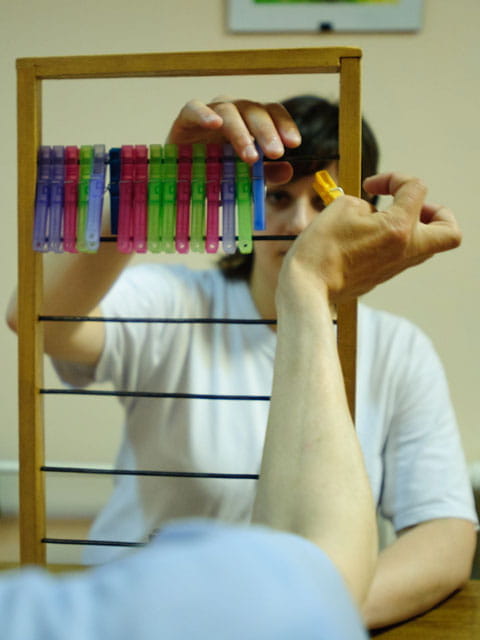
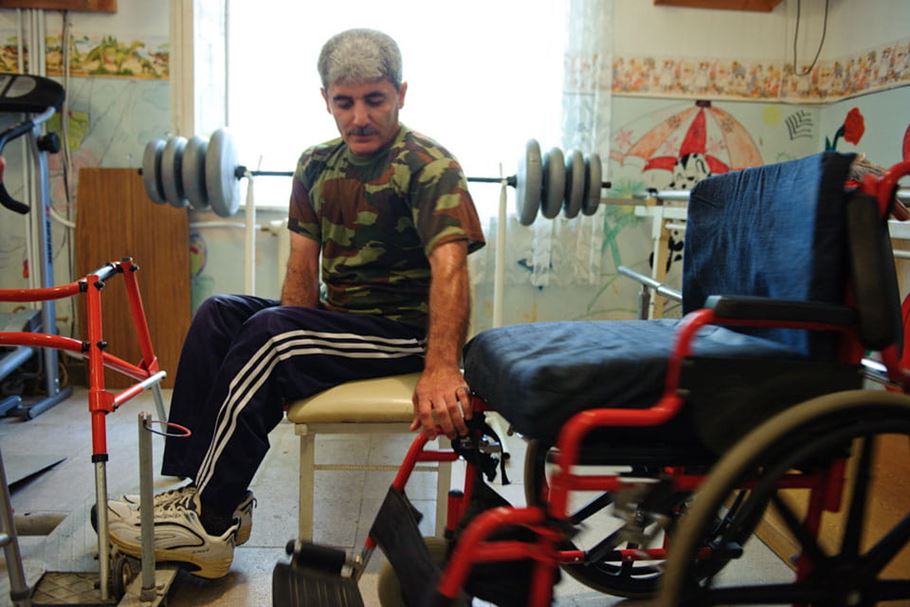
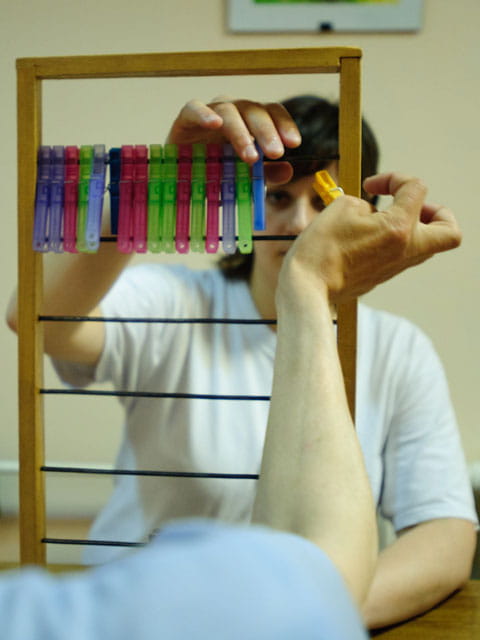
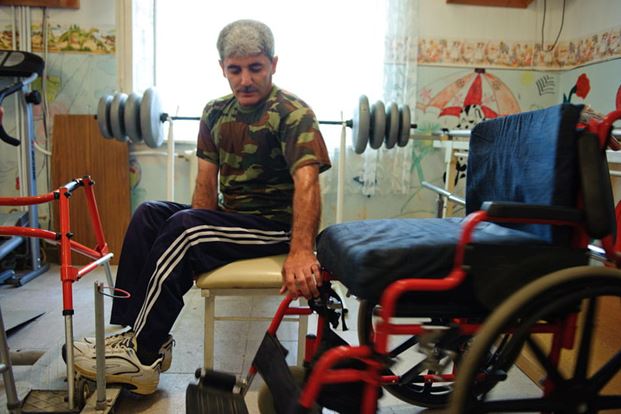
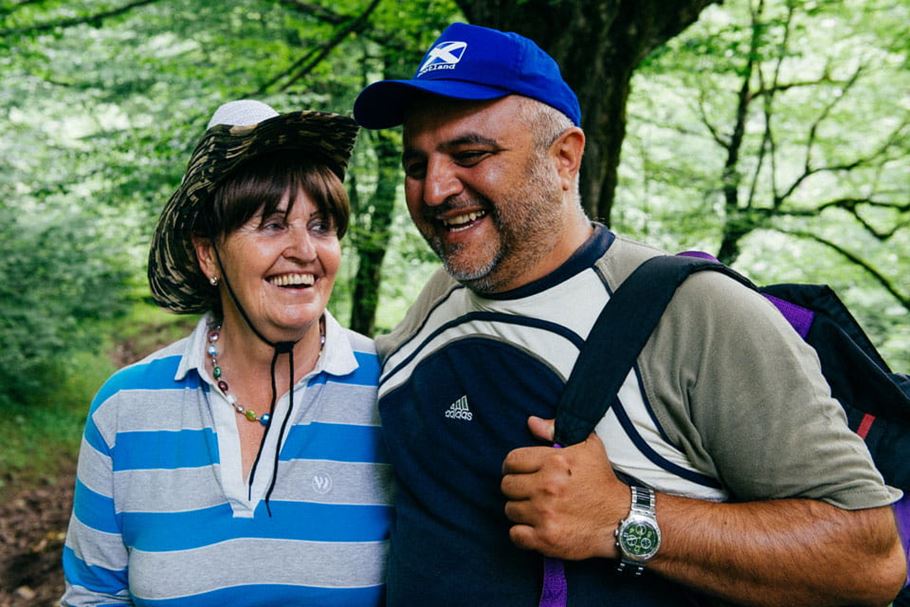
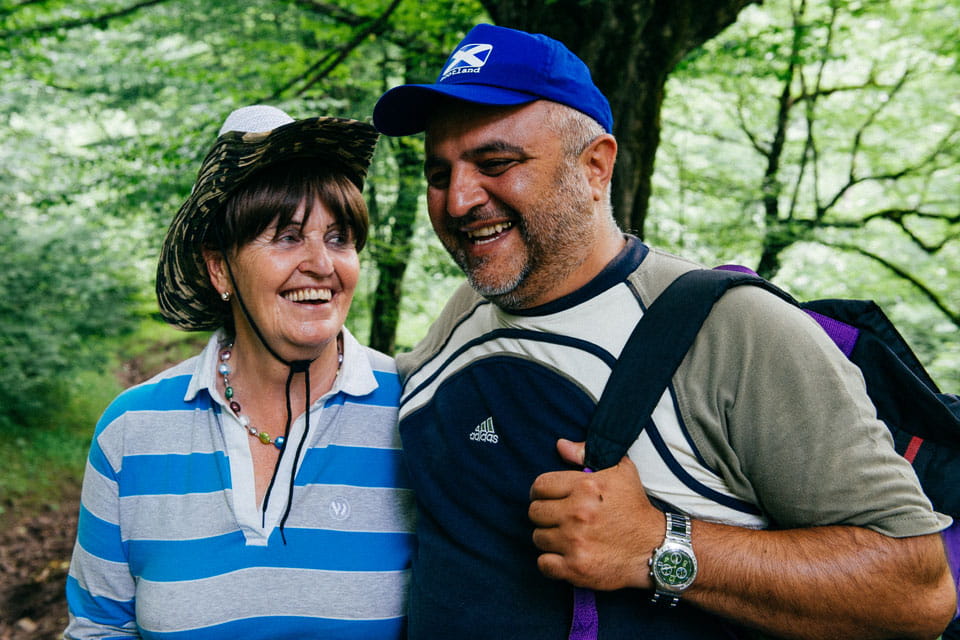
Clockwise: patient relearns how to use his hands, getting onto a wheelchair, Vardan and Baroness Cox.
Fit for purpose
‘When I arrived in 1999, it didn’t have any furniture, and a lot of it was completely inaccessible for disabled people.’
He set about renovating it and making it fit for purpose. He also began employing nurses to work there – setting up a special one-year training course for them to become ‘rehabilitation therapists’.
When The Lady Cox Rehabilitation Centre finally opened in Stepanakert, Nagorno-Karabakh, in 2000, they could only deal with a small number of those needing some kind of rehabilitation. Today, the centre has 60 nurses and treats around 1,000 people every year, but Vardan estimates that they are still only able to treat about one tenth of those needing their help.
The scope of the centre’s rehabilitation work ranges from treating spinal injuries for war veterans, to speech therapy and psychological care. The work of rehabilitation keeps expanding, and now includes art, sport and much more. Over half of those who receive the help are children, with large numbers of elderly patients too – the oldest is currently 96.
Spread the vision
The centre is now supported by the Nagorno-Karabakh government, but its income is also supplemented by Baroness Cox’s organisation, HART. Vardan is seeking to expand the work, training up hospitals around the region to offer the same kinds of treatment. Last year he also opened a residential centre for people with complex autism, again the first in the country.
He hopes that the current centre will be seen as a ‘centre of excellence’, to be emulated across the region and beyond – Vardan believes that the combination of occupational and physical therapy offered here is currently unique. He has already been able to share the principles of their work with a delegation from Myanmar. There are hopes of a similar project being set up there.
‘‘My dream is peace, and I believe the people who have been damaged by war can help to bring this about.’’
Along with expanding the rehabilitation, he passionately wants to see people with all types of disability brought out of the shadows and integrated into regular life in Nagorno-Karabakh. Vardan has become a keen advocate for disabled people’s rights and the prejudices over disability.
‘We’re working hard with the families; before, it was a stigma to even bring a disabled child into public places. Now they are coming to us with their children to get treatment. Things are changing like a rocket.’
Blessed peacemakers
With the civil conflict in Nagorno-Karabakh still unresolved there’s one more vision that Vardan has.
‘This region is really fragile – the peace that we have. My hope is for the centre to be a centre of trust, where the people from different countries and ethnic groups can come together, and forget that they were enemies. And central to that will be the patients themselves, who learn and heal together without prejudice.
‘We have held a number of round table discussions with disabled ex-combatants – these have received a lot of attention. It surprised me that most, if not all of these ex-combatants, were ready to live together, if Nagorno-Karabakh can be recognised.
‘My dream is peace, and I believe the people who have been damaged by war can help to bring this about.’
Vardan Tadevosyan is an Inspired Individual. Tearfund's Inspired Individuals programme exists to identify, develop and connect new leaders who are aspiring to live like Jesus and whose dreams have the potential to transform some of the most needy places and people in our world.
Pray for this work:
- Pray that this remarkable work will continue to grow and spread throughout the Nagorno Karabakh region.
- Ask for Vardan’s work to change attitudes to disability there.
- Pray for his peacemaking work with the former soldiers, that they can defuse the continuing tensions in the region.
Share this page
Share this page to spread the word and help support those in need.

Get our email updates
Learn about our work and stay in touch with Tearfund. Hear about our news, activities and appeals by email.
Sign up now - Get our email updates





.png)
